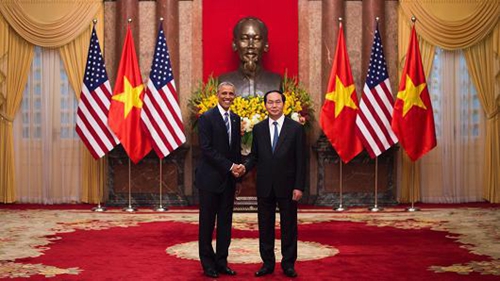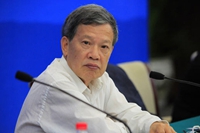By Lin Dequan, Researcher of Center for World Affairs Studies, Xinhua News Agency
United States President Barack Obama ended his three-day visit to Vietnam on May 25. The International community has paid much attention to his trip.

Late visit
In the evening of May 22, Obama arrived in Hanoi for his first three-day Vietnam trip, which had been his tenth visit to Asia, while serving as President.
He has taken the strategy of "return to Southeast Asia", "return to Asia", "Asia-Pacific re-balancing," while visiting seven ASEAN (Association of Southeast Asian Nations) member countries.
Hanoi had extended an invitation to Obama in 2013, but he waited to visit the country after a transfer of Vietnam's communist party and state leadership.
Vietnam-US relations Trilogy
Obama is the fifth sitting-US president to visit Vietnam. Since the 1960s, Vietnam-US relations have undergone profound changes, from a "hot war" to "Cold War," and to "handshake cooperation."
The Vietnam War ended on April 30, 1975. The "Cold War" stage had lasted from 1975 to the establishment of Vietnam-US diplomatic relations in 1995.
During the Cold War period, Washington had enforced full trade and arms embargoes against Hanoi. In the 1990s, the Cold War had come to an end. Accordingly, Hanoi had embarked on its reform path.
Washington had lifted a trade embargo against Vietnam in 1994. Both sides had achieved normalization of diplomatic relations, "putting aside the past and looking forward to the future" in 1995.
Now, bilateral relations have reached the stage of handshake cooperation. In recent years, Vietnam's State President, Prime Minister, President of the Congress had all visited the US.
Vietnamese Communist Party General Secretary Nguyen Phu Trong had paid a historic trip to the US in July, 2015 as both sides signed a "comprehensive partnership" in 2013.
Mutual relations have undergone dramatic changes from "mortal enemy" status to "comprehensive partnership.”
Cooperation and struggle
During Obama's visit, he met Vietnamese state and party leaders. The two sides have reached consensus on a series of issues.
The Vietnam's People's Army Newspaper described the visit as a new imprint for Vietnam-US relations. Nguyen Phu Trong, General Secretary of the Vietnamese Communist Party, was invited to visit the US .
Obama was welcomed at the CPV Central Committee headquarters. Both nations seek to maximize their national interests.
There exist differences between both states and each nation would stick to their bottom lines. Vietnam-US relations have made considerable progress over the past 21 years in regards to economic and trade cooperation. Yet, obstacles remain.
Coping with shifting events
Vietnam's late leader President Ho Chi Minh has cited an old Chinese saying, "coping with shifting events by sticking to a fundamental principle," which refers to national independence and socialism.
The 12th CPV Congress and the 13th session of the National Assembly, which were held early this year, had elected new Party and state leaders for the nation.
- Hanoi has endorsed innovating thinking, developing Marxism- Leninism, Ho Chi Minh Thought, and set firm to national independence and socialism.
-Pursuing a diplomatic route on independence, autonomy, peace, cooperation and development to integrate into the international community.
-To become a responsible member of the international community to maintain peaceful and stable environment for national development and improving people's living standards that would enhance its national prestige.
The CPV would keep high alert to prevent subversion riots or any form of color revolutions on its development path.
Since the beginning of May, many domestic and foreign hostile forces in Vietnam have exploited the incident of dead fish caused by coastal pollution in central Vietnam.
Protestors had incited illegal street demonstrations in Hanoi, Ho Chi Minh City and elsewhere, but the plot had been foiled.
The "VIET TAN" (Vietnam Freedom Party) was characterized as a terrorist organization. Its activitists have fled to the US.
Military sales and human rights
Over the years, Hanoi has called for Washington to lift its ban on military sales to Hanoi, but the US government, Congress and various political forces have refused, citing Vietnam's poor human rights record.
On May 23, Obama announced a comprehensive lifting of the ban on lethal weapons sales towards Vietnam. Obama also suggested Washington would continue to deal with arms exports by reviewing individual cases.
Vietnamese military officials have pointed out that if Washington insisted on an arms embargo, bilateral relations could not be considered fully normalized.
Hanoi does not know what weapons Washington would provide, and whether Hanoi could purchase such weaponry. 90 percent of Vietnam's weapons come from Russia, which are not compatible with US weapons systems.
During the one and a half years since the Washington's partial lifting of the arms embargo on Vietnam in 2014, both sides have not made any arms sales transactions.
Nevertheless, would Washington no longer use "weapons of human rights" as a prerequisite for military sales?
Recently, the media had allegedly reported that Hanoi and Washington are forming a military alliance against Beijing, speculating that Washington and Tokyo forces would be stationed in Cam Ranh Bay naval base.
That would be a deliberate provocation against Sino-Vietnam relations.
Since the end of the 1980s, Hanoi has abandoned its "one-sided" foreign policy. Hanoi is pursuing a diplomatic policy of independence, autonomy and openness, and multi-lateralization of international relations to maintain relative balance between great powers.
Hanoi has reiterated its national defense policy: not participating in military blocs or military alliances, no allowances on establishing foreign military bases in Vietnam, nor relying on one state against another state."
Nowadays, it has become trendy to build bilateral relations based on mutual respect, equality and mutual benefits.
Accordingly, people hope that Vietnam will engage in normal and healthy relations with other nations including the US to promote regional peace, stability and development.

Lin Dequan, Researcher of Center for World Affairs Studies, Xinhua News Agency
( The opinions expressed here do not necessarily reflect the opinions of Panview or CCTV.com. )

Panview offers an alternative angle on China and the rest of the world through the analyses and opinions of experts. We also welcome outside submissions, so feel free to send in your own editorials to "globalopinion@vip.cntv.cn" for consideration.















